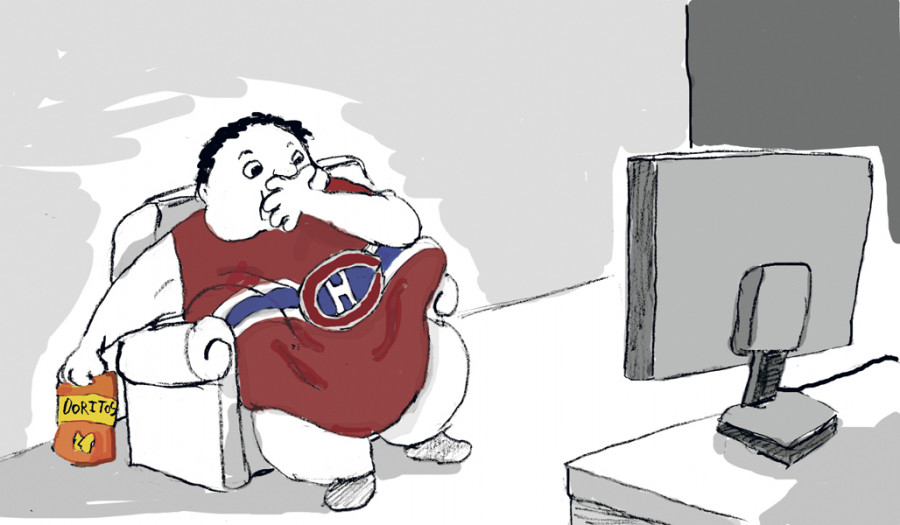Unhealthy Hab-session
On Thursday night, the bars were packed. Beer was shared, nachos were ordered and a good time was had, though the Montreal Canadiens ultimately fell 2-0 to their archrivals, the Toronto Maple Leafs. It wasn’t just the beginning of a new National Hockey League season, though—it was also the start of another unhealthy body season.
During the NHL season, die-hard Canadiens fans will drop everything to sit down and watch their team play. Often, this is to the tune of six hours a week minimum, for eight months straight.
Many people think of the hockey season as positive—an economic shot in the arm for local businesses, an excuse to drink and eat more and a chance for hard working people to get away from their professional lives and relax with their buddies.
Students especially will head to the local watering hole for some cheap drinks and an excuse to escape the fortress of books and midterms—in some cases, at the expense of both their grades and their guts.
“A lot of students can easily get distracted from their school work,” said 23-year-old Concordia student Maria Sofroniou. “They may end up watching the game on their laptops during their night classes, which leads to them not paying attention in class.”
Some die-hards take it a step further and make it a necessity to watch hockey at all costs. “Every time there’s a game on, it’s […] hard-wired in our heads that we have to watch the game and not do any homework,” said 19-year-old Concordia student Tyler Finigan. He sees his peers openly admit to professors that when the Habs play, their productivity drops—and the professors buy it. “People prioritize hockey over anything else.”
This includes their bodies, it turns out. Drinking, as you may have heard, stops all functions of the liver, and it also stops the distribution of nutrients, which the body needs in order to keep your metabolism working properly.
So eating pizza, chips, burgers and topping it off with a couple brews—for eight months straight—might have you weighing about the same as Habs defenseman Hal Gill, (who’s listed at 241 pounds), but certainly not looking like him (he’s a 6’7” millionaire professional athlete).
“It would be interesting to see how many people who go to the arena are obese, and if their eating habits at the arena are carried on at home,” said Université de Québec à Montréal kinesiology expert Anthony Karelis about the culture of hockey unhealthiness.
Karelis thinks one simple lifestyle change could benefit people when they watch hockey. Like many an old-time goalie coach, Karelis suggests people, well, just stay standing up.
According to Karelis, there’s a significant correlation between cardiovascular disease and jobs that require people to stay sitting, and it doesn’t help that most people sit down to watch the game when they get off work, too.
“The difference between thin people and obese people is that thin people stand up more during the day,” said Karelis. “Maybe [hockey fans] should stand up when they watch the game.”
It may not seem like much, but the difference between standing and sitting during the day is substantial. People can burn 352 calories more during the day just by staying upright—the equivalent of a 30-minute treadmill workout.
Though some might not like the sound of it, of course, the best way to maintain your beach-bod is often to do it the old-fashioned way. “Good management is the key,” says Concordia University biochemistry professor Abbas Kezouh.
“People should at least develop a healthy schedule, plan ahead, eat healthy during the day and exercise in the morning so that when the game comes on at night, you’ve felt rewarded.”
The same can be said for studying and completing assignments—but with enough praying to the hockey gods, guilt-free hockey might still be had come April. (After your exams, of course.)



